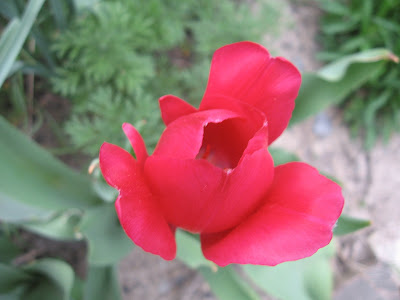


Variegated Tulip - Beautiful You

Yellow Tulip - Hopeless Love
Lives not alone immured in the brain,
But, with the motion of all elements,
Courses as swift as thought in every power,
And gives to every power a double power,
Above their functions and their offices.
It adds a precious seeing to the eye;
A love's eyes will gaze an eagle blind;
A lover's ears will hear the lowest sund,
When the suspicious head of theft is stopp'd:
Love's feeling is more soft and sensible
Than are the tender horns of cocked snails:
Love's tongue proves dainty Bacchus gross in taste.
For valour, is not love a Hercules,
Still climbing trees in the Hesperides?
Subtle as Sphinx as sweet and musical
As bright Apollo's lute, strung with his hair;
And when Love speaks, the voice of all the gods
Makes heaven drowsy with the harmony.
Never durst poet touch a pen to write
Until his ink were temper'd with Love's sighs.
Love's Labour's Lost William Shakespeare 1564-1616
Its name comes from the Persian word "tulipant" meaning turban which was used to describe the shape of flower. However, it was Holland that took the tulip to its heart. In fact, tulipmania put Holland's economy in jeopardy.
A Persian legend tells of the origin of tulips. A young man, Farhad, was in love with a beautiful woman, Sharin. One day Farhad received news that his lover was dead. In his grief, Farhad jumped off a high cliff and where his body landed, there the tulips first grew. The saddest part was that the message was sent by jealous rival and Sharin was actually still alive.

The tulip grows upright and is regarded as a flower of the sun. It faces into the light and it closes its petals at dusk.
Tulips were first brought to America by the Dutch colonists who settle in the northeastern part of the country. The popularity of these flowers in those communities is obvious from the prevalence of the tulip in Pennsylvania Ducth designs from the period.

Tulips are grown solely for pleasure, having no value for the herbalist. However, the hungry populace of occupied Europe ate them during the war.
how they raise their coloured cups
and demand to sup."
Hafis - Persian poet - 1327-90

No comments:
Post a Comment